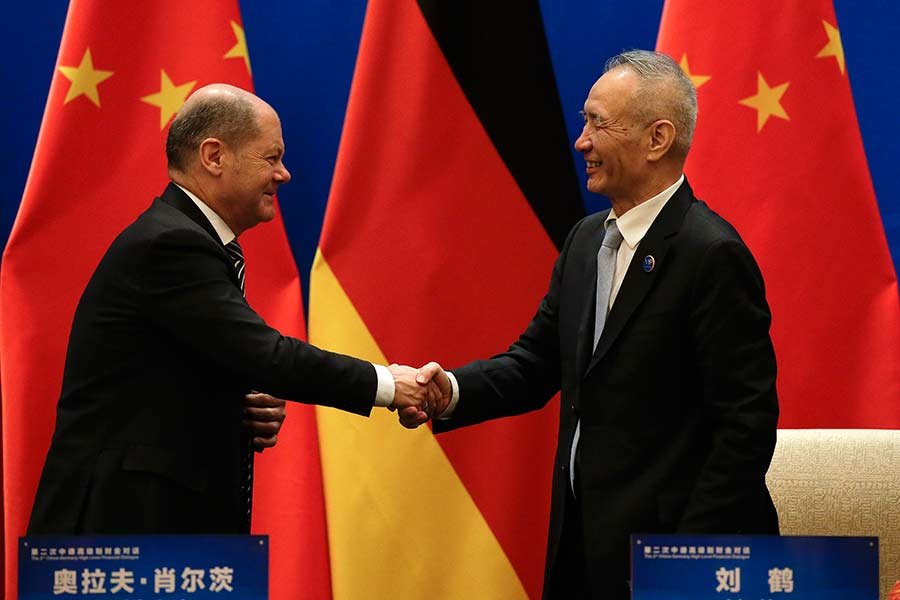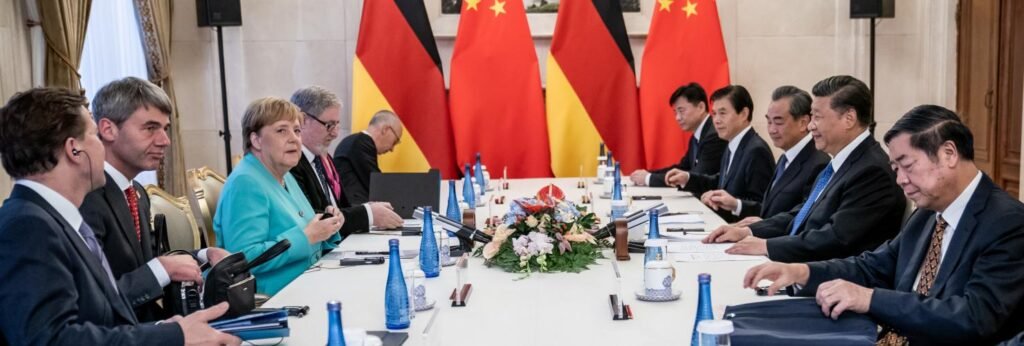China-Germany relations are characterized by a complex interplay of economic cooperation, political dialogue, and cultural exchange. Both nations are significant global players with considerable influence in their respective regions. Understanding the dynamics of their relationship requires delving into historical contexts, examining contemporary interactions, and considering prospects. This comprehensive analysis will explore various dimensions of the China-Germany relationship, including historical ties, economic interdependence, political cooperation, cultural exchange, and emerging challenges.
Historical Context:
The history of Sino-German relations dates back centuries, with sporadic contacts documented as early as the 17th century. However, modern diplomatic ties between the two countries began in the late 19th century. In 1861, China and Prussia, the predecessor of modern Germany, signed their first treaty, initiating formal diplomatic relations. Over the following decades, interactions between the two nations remained limited but increased gradually.
In the early 20th century we witnessed significant shifts in China-Germany relations, particularly during the tumultuous period of World War I and its aftermath. Germany’s support for China’s stance against the Treaty of Versailles, which imposed harsh penalties on Germany, fostered a sense of solidarity between the two nations. However, this camaraderie was short-lived, as the rise of the Nazi regime in Germany and its subsequent aggression in Europe strained relations with China.
The period of Nazi rule saw a marked deterioration in Sino-German ties, primarily due to Germany’s alignment with Japan, China’s adversary during the Second Sino-Japanese War. Despite initial attempts at cooperation during the 1930s, including military training and technology transfers, the relationship soured as Germany’s expansionist policies clashed with China’s interests in East Asia. The outbreak of World War II further severed diplomatic connections between the two countries.
Following the war, Germany was divided into East and West, with the Federal Republic of Germany (West Germany) and the German Democratic Republic (East Germany) emerging as separate entities. China’s recognition of the People’s Republic of China (PRC) in 1949 led to the establishment of diplomatic relations between East Germany and the PRC. Meanwhile, West Germany maintained diplomatic ties with the Republic of China (ROC) in Taiwan until 1972, when it switched recognition to the PRC.

Economic Interdependence:
The economic dimension forms the cornerstone of contemporary China-Germany relations. Both countries are major global economies, with Germany being Europe’s largest economy and China the world’s second-largest. Their economic interdependence is multifaceted, encompassing trade, investment, technology transfer, and industrial cooperation.
China has become Germany’s most important trading partner outside of the European Union (EU). Bilateral trade between the two countries has witnessed exponential growth since the late 20th century, with China emerging as Germany’s largest trading partner in Asia. Germany’s export-oriented economy has benefited significantly from access to the vast Chinese market, while China has gained access to German technology, expertise, and high-quality manufactured goods.
German companies, renowned for their engineering prowess and innovation, have established a strong presence in China. They have invested heavily in various sectors, including automotive, machinery, chemicals, and renewable energy. Conversely, Chinese investments in Germany have also increased in recent years, particularly in strategic industries such as automotive manufacturing, technology, and infrastructure.
However, economic relations between China and Germany are not without challenges. Issues such as market access barriers, intellectual property rights protection, and concerns over unfair trade practices have strained bilateral trade ties. Moreover, Germany, along with its EU counterparts, has raised concerns about China’s state-led economic model, lack of transparency, and human rights abuses.
Despite these challenges, both countries recognize the mutual benefits of economic cooperation and have sought to deepen their economic ties through various initiatives. For instance, the “Made in China 2025” initiative aims to upgrade China’s manufacturing capabilities with a focus on high-tech industries, presenting opportunities for collaboration with German firms specializing in advanced manufacturing and technology.

Political Cooperation:
Political dialogue between China and Germany has evolved significantly in recent decades, driven by shared interests in global governance, multilateralism, and regional stability. Both countries actively participate in international organizations such as the United Nations, G20, and World Trade Organization, where they often coordinate their positions on various issues.
Germany has played a crucial role in shaping the EU’s approach towards China. As one of the EU’s largest economies and a key member state, Germany’s stance on China influences EU policies on trade, investment, and human rights. In recent years, the EU has adopted a more assertive posture towards China, emphasizing the need for reciprocity, fair competition, and respect for human rights in bilateral relations.
At the bilateral level, China and Germany have established various mechanisms for political dialogue and cooperation. The “Intergovernmental Consultations,” held annually since 2011, serve as a platform for high-level discussions on a wide range of bilateral, regional, and global issues. These consultations cover areas such as trade, investment, innovation, climate change, and cultural exchange, reflecting the depth and breadth of the bilateral relationship.
Despite areas of cooperation, differences in political systems, values, and strategic interests occasionally lead to tensions between China and Germany. Issues such as human rights, freedom of expression, and democracy remain sources of contention, with Germany and the EU consistently raising concerns about China’s human rights record, particularly regarding Tibet, Xinjiang, and Hong Kong.
Moreover, China’s growing assertiveness in the South China Sea, its military modernization efforts, and its expanding global influence have raised eyebrows in Berlin and other Western capitals. Germany has reiterated its commitment to a rules-based international order and has called for dialogue and peaceful resolution of disputes under international law.
Cultural Exchange:
Cultural exchange between China and Germany has a long history, encompassing areas such as language, education, arts, and tourism. Both countries have rich cultural traditions and a deep appreciation for each other’s heritage, which serves as a bridge between their peoples.
The study of the Chinese language and culture has gained popularity in Germany, with many educational institutions offering Chinese language courses and cultural programs. Similarly, German cultural institutions, such as museums, theaters, and universities, frequently organize events and exhibitions showcasing Chinese art, literature, and traditions.
In the field of education, academic exchange programs and collaborations between Chinese and German universities have flourished, fostering cross-cultural understanding and cooperation. These initiatives encompass joint research projects, student exchanges, and faculty visits, providing valuable opportunities for learning and collaboration.
Tourism is another important aspect of cultural exchange between China and Germany. Increasing affluence and improved transportation links have led to a growing number of Chinese tourists visiting Germany, eager to explore its rich history, picturesque landscapes, and vibrant cities. Similarly, German tourists are drawn to China’s millennia-old civilization, diverse landscapes, and modern metropolises.
Cultural diplomacy plays a crucial role in promoting mutual understanding and strengthening people-to-people ties between China and Germany. Cultural events, such as film festivals, music concerts, and art exhibitions, serve as platforms for cultural exchange and dialogue, fostering goodwill and friendship between the two nations.
Emerging Challenges:
Despite the deepening economic, political, and cultural ties between China and Germany, several challenges loom on the horizon, posing potential risks to the bilateral relationship. One of the primary challenges is the increasing geopolitical competition between China and Western powers, particularly the United States.
Germany finds itself in a delicate balancing act between its economic interests in China and its security
